YIN/YANG Collection
Recipe Cards
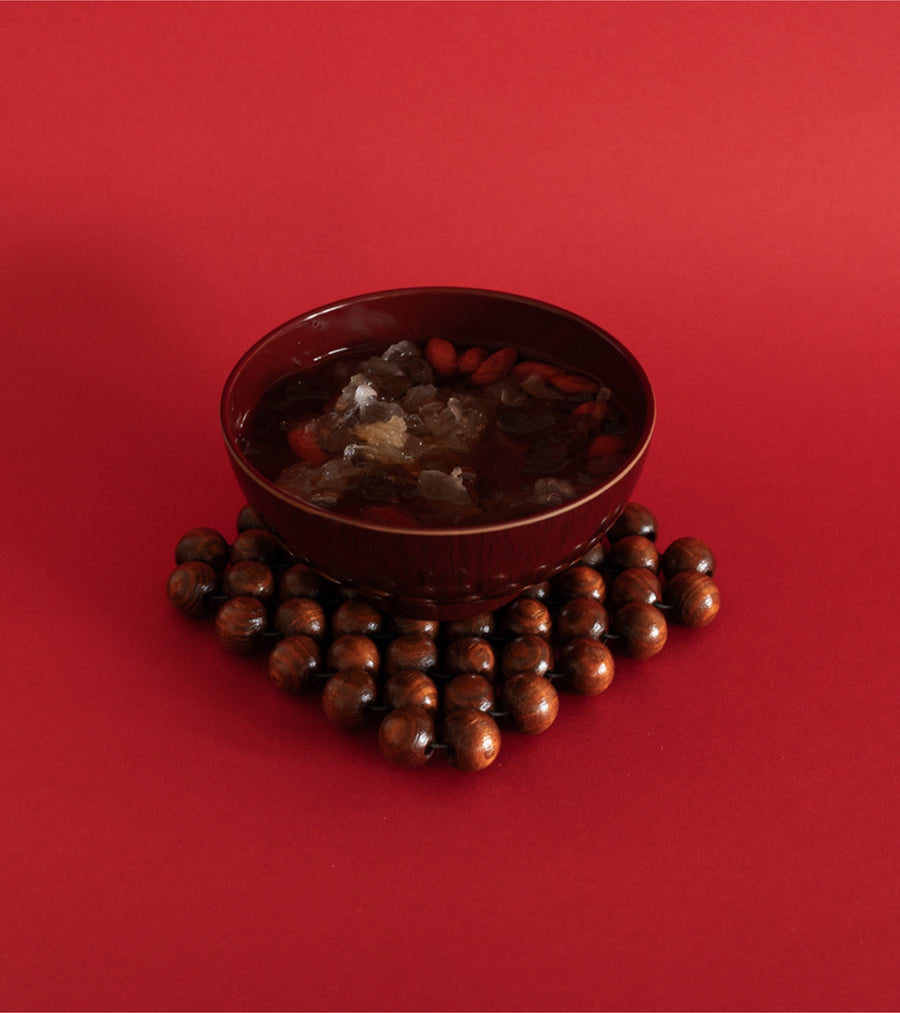
Recipe
Serves 2.
Snow fungus is a mild, nearly flavourless mushroom which you can buy dried, and which is thought to have anti-aging properties. After cooking, it should have a silky texture, which is associated with beautifying properties. It’s thought to be cooling, but this particular soup is a masterclass in balance, filled with both cooling and warming ingredients to nourish the body without taxing it. This recipe is already packed with nutrients, as you can see from its fairly long list of items. If you’d like additional benefits, you can also incorporate lily bulbs and ginger.
Ingredients:
- Dried peach gum, 10g
- Dried snow swallow, 10g
- Dried snow fungus, 25g
- Dried lotus seeds, 10g
- Dried longan, 10g
- Jujubes, 15g
- Dried goji berries, 5g
- Rock sugar
Steps:
- In 2 separate bowls, soak peach gum and snow swallow overnight until expanded and softened.
- Drain and remove any black impurities from peach gum and snow swallow.
- Cover snow fungus and lotus seeds with room temperature water and soak for 1 hour. Rinse and drain.
- Remove the tough, woody centre from any snow fungus pieces.
- Add snow fungus, lotus seeds, longan, and jujubes to a pot with 750ml of water.
- Bring to a boil over medium heat. Cover and lower heat.
- Simmer for 1–2 hours, until the snow fungus is soft and slippery. It can be slightly springy, but it should not be crunchy.
- Once the snow fungus is cooked through, add rehydrated peach gum and snow swallow to pot. Continue to simmer for 15 mins.
- Add goji berries while the soup is still simmering. Simmer for another 5 minutes.
- Add and dissolve rock sugar to taste.
- Serve warm or chilled.
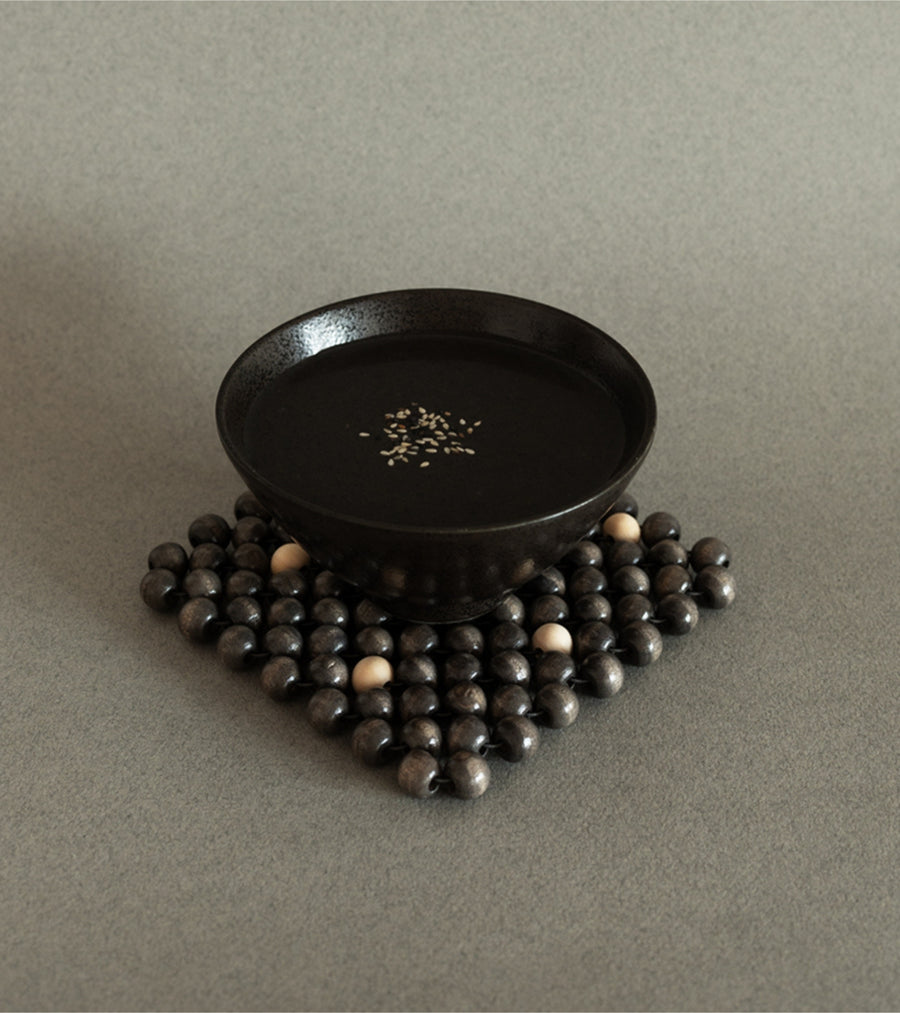
Recipe
Serves 2.
This simple but effective tea is popular for its balancing and even beautifying properties. The “three reds” in the name refer to its three red ingredients. It is caffeine-free and can be drunk throughout the day—even chilled, though most people have it warm so as not to counteract its effectiveness. This recipe is so easy that it hardly feels right to call it a “recipe”. But we’ve included it because it’s such an essential, everyday way that people incorporate Traditional Chinese Medicine into their lives. Make this tea every day and enjoy with mulberries, especially when they’re fresh and in season!
Ingredients:
- Dried goji berries, 25g
- Dried hawthorn berries, 25g
- Jujubes, 10g
- Rock sugar
- Dried or fresh mulberries
Steps:
- Add all ingredients to a pot with 500ml of water.
- Bring to a boil, then turn down heat.
- Simmer for 15 minutes.
- Add and dissolve rock sugar to taste. You can also leave it out.
- Serve warm. We like to balance this warming tea with a side snack of cooling dried or fresh mulberries.
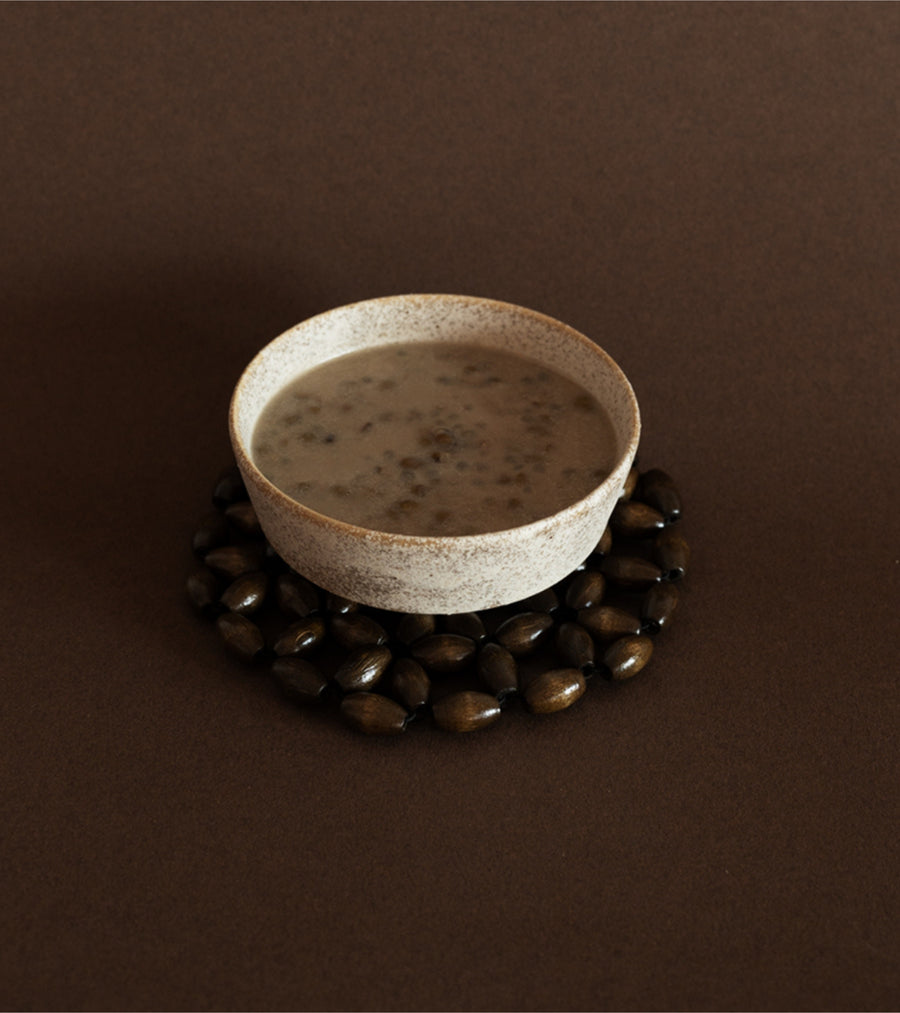
Recipe
Serves 2.
Mung bean soup is eaten as a dessert in Chinese culture. It is nutritious and easy to eat, almost like a sweet porridge. In Traditional Chinese Medicine, it is also thought to be cooling. This recipe is a very simple version of the soup. Make sure to use whole mung beans, which are green, and not yellow split mung beans. In addition to the ingredients listed in this recipe, you can also flavour the soup with dried tangerine peel during cooking, and enrich it with a drizzle of coconut milk and a pinch of salt after.
Ingredients:
- Whole mung beans, 50g
- Sago pearls, 25g
- Pandan leaf, 1 knotted
- Rock sugar
Steps:
- Rinse mung beans. Soak in a bowl overnight.
- The next day, soak sago pearls for 10 minutes, then drain.
- Drain mung beans. Add to a pot with knotted pandan leaf and 500ml of water.
- Bring to a boil. Cover and lower heat.
- Simmer for 1 hour or until beans are extremely tender.
- Add sago pearls and cook for another 8 minutes.
- While the soup is still hot, add and dissolve rock sugar to taste.
- Served warm or chilled.
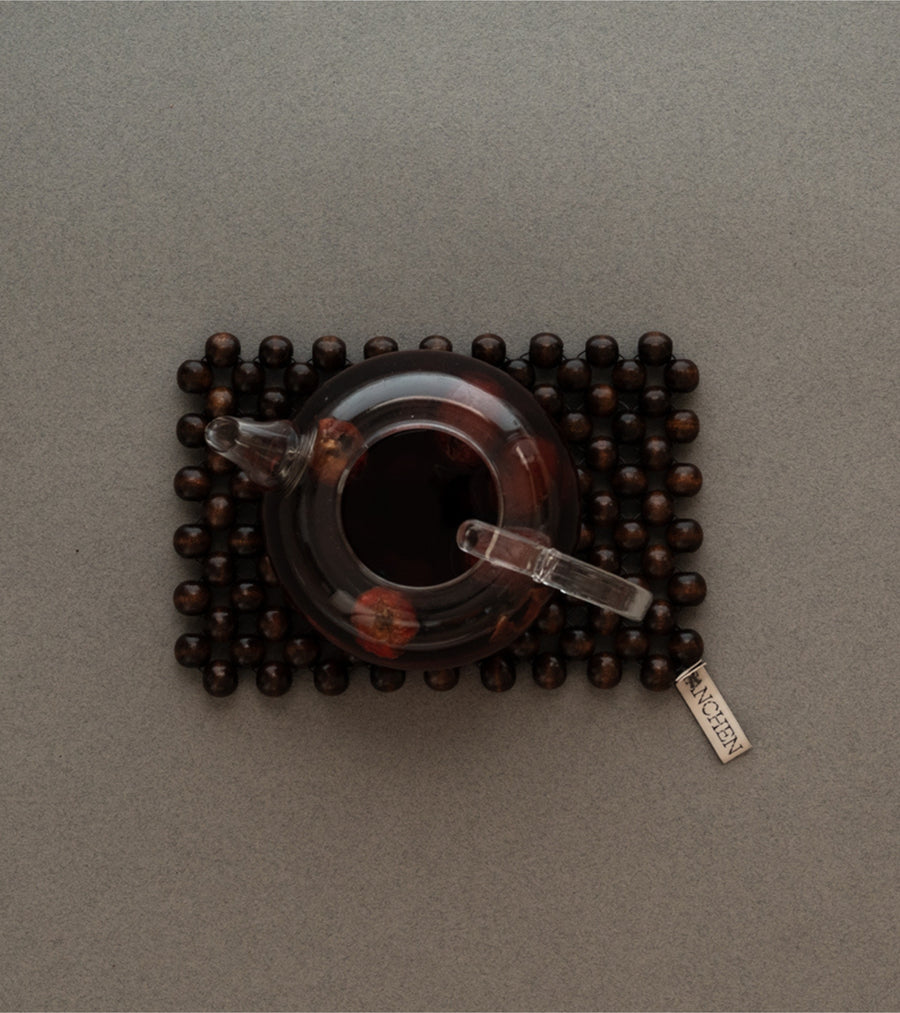
Recipe
Serves 2.
This simple but effective tea is popular for its balancing and even beautifying properties. The “three reds” in the name refer to its three red ingredients. It is caffeine-free and can be drunk throughout the day—even chilled, though most people have it warm so as not to counteract its effectiveness. This recipe is so easy that it hardly feels right to call it a “recipe”. But we’ve included it because it’s such an essential, everyday way that people incorporate Traditional Chinese Medicine into their lives. Make this tea every day and enjoy with mulberries, especially when they’re fresh and in season!
Ingredients:
- Dried goji berries, 25g
- Dried hawthorn berries, 25g
- Jujubes, 10g
- Rock sugar
- Dried or fresh mulberries
Steps:
- Add all ingredients to a pot with 500ml of water.
- Bring to a boil, then turn down heat.
Simmer for 15 minutes. - Add and dissolve rock sugar to taste. You can also leave it out.
- Serve warm. We like to balance this warming tea with a side snack of cooling dried or fresh mulberries.
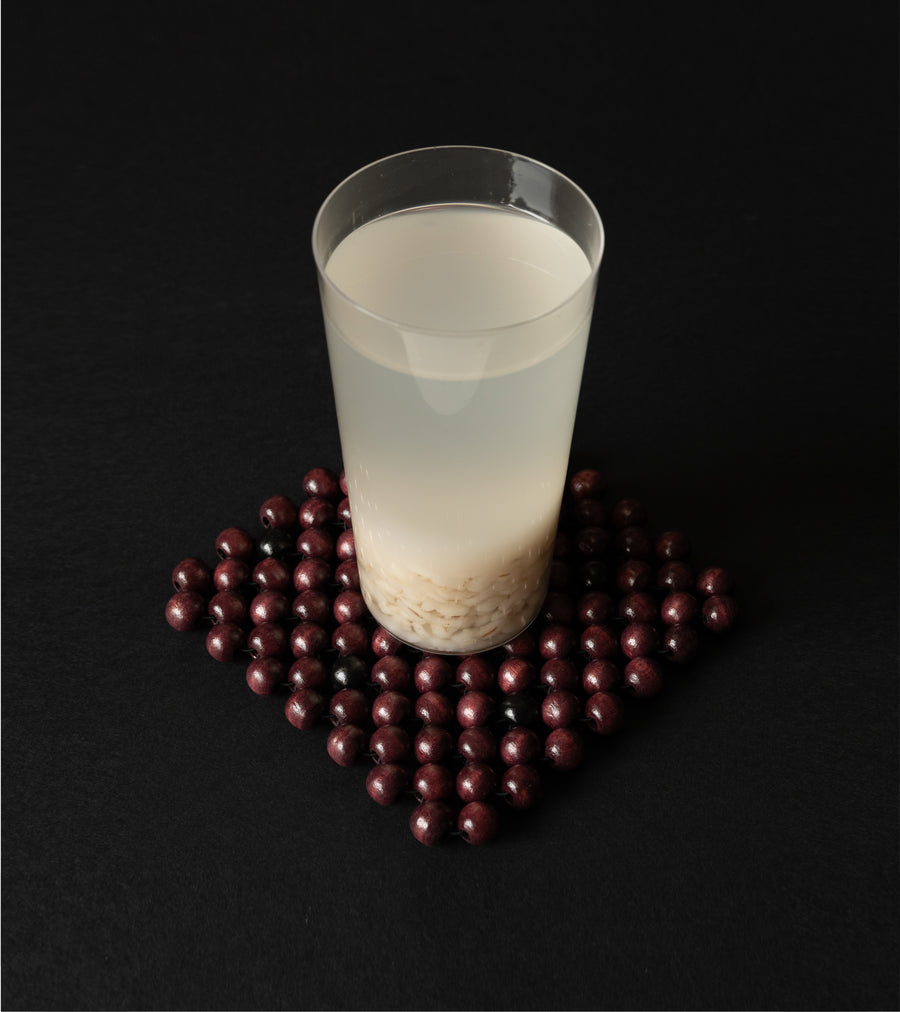
Recipe
Serves 2.
Barley water is often used to treat heatstroke and dehydration in the summer. Taken hot or cold, it’s deeply thirst quenching, and considered to be a cooling and replenishing drink. This infused version is beloved by the Chinese diaspora in Southeast Asia, with pandan adding fragrance and candied winter melon adding sweetness and fruitiness. You can leave them out or get creative with additional flavourings of your choice.
Ingredients:
- Dried Chinese pearl barley, 50g
- Pandan leaf, 1 knotted
- Candied winter melon, 25g
- Rock sugar
Steps:
- Rinse the barley.
- Add the barley, pandan leaf and candied winter melon to a pot with 500ml of water.
- Bring to a rolling boil over medium heat.
- Lower heat and simmer for 1 hour, stirring occasionally. The barley should be soft, but have a slight chew, and the water should turn cloudy.
- Add and dissolve rock sugar to taste.
- Serve warm or chilled. You can drink the liquid and eat the cooked barley.


















